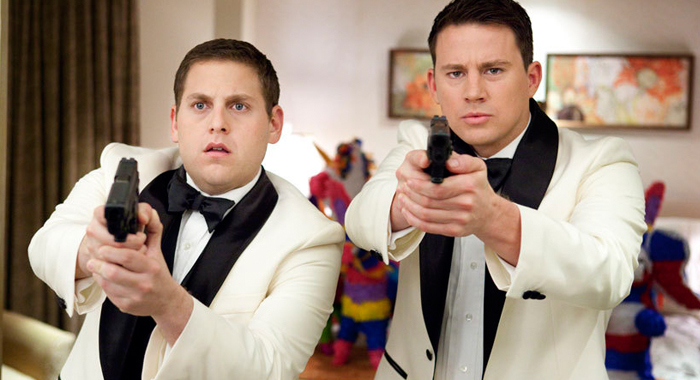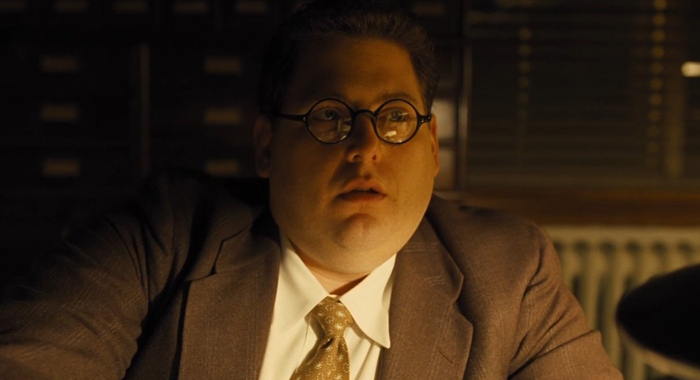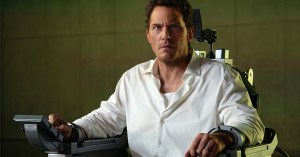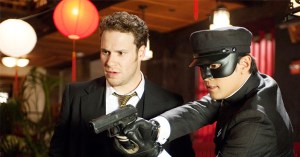Jonah Hill’s Best Movies
In this week's Total Recall, we take a look back at the most acclaimed work of the War Dogs star.
With this weekend’s War Dogs, Jonah Hill teams up with Miles Teller to tell the reality-inspired tale of two guys out to strike it rich as arms dealers. It’s just the latest in a series of eclectic roles for Hill, who made his name as a member of the Apatow comedy stable before branching out into more dramatic fare, and we’re here to celebrate it with a fond look back at some of the brightest critical highlights from his growing filmography. It’s time for Total Recall!

Years after they roomed together as young comics with showbiz dreams, Adam Sandler and writer/director/producer Judd Apatow reunited for 2009’s Funny People, which surrounded Sandler with a crowd of comedic talent that included multiple members of the Apatow stable — including Seth Rogen, who plays an aspiring comedian who lucks into a friendship with Sandler’s embittered superstar, and Hill, who plays Rogen’s roommate and a fellow veteran of the stand-up circuit whose own career ambitions end up getting tangled in the complicated relationship between Rogen and Sandler’s characters. The movie’s 146-minute length turned off a number of critics, but it was just right for Ben Lyons of At the Movies, who wrote that “Apatow has always found a balance of heart and humor in his best films, and Funny People is no exception.”

Hill and Russell Brand triggered a few laughs during their scenes together in Forgetting Sarah Marshall — so when it was decided that Brand would reprise his character in the Marshall spinoff Get Him to the Greek, it was only natural that the duo should be reunited. Here, Brand’s Aldous Snow must be shepherded to a crucial gig through a landmine of bad decisions and irresponsible behavior, with responsibility for his whereabouts falling to an increasingly overmatched label rep played by Hill. “The movie’s a good, rude commercial comedy,” argued the Chicago Tribune’s Michael Phillips. “How many good movies have we even seen this year?”

Hill earned his second Best Supporting Actor Oscar nomination for his work in The Wolf of Wall Street, a luridly over-the-top Martin Scorsese epic that uses the real-life exploits of disgraced stockbroker Jordan Belfort as the launchpad for a wild-eyed look at modern capitalism — and three hours of drug-fueled insanity. Always entertaining as part of a duo, Hill turns in some of his best work as a foil for Leonardo DiCaprio’s Belfort, playing the comparatively less unscrupulous part in a gonzo dramatization of one of Wall Street’s more infamous cautionary tales. “For three hours the movie operates at a ridiculous comedic pitch. You never forget you’re at the circus,” Wesley Morris wrote for Grantland. “You never lose sight of the lawlessness, the reckless pleasure, the sheer lunacy and lack of regulation.”

The 21st century has brought us no shortage of comedies about schlubby man-children, but Cyrus is something different. Rather than going broad and over-the-top with the story of an overgrown mama’s boy (Hill) who plants himself squarely between his mom (Marisa Tomei) and her well-meaning new suitor (John C. Reilly), writer-directors Jay and Mark Duplass gave their seemingly tired premise a fresh mumblecore spin, playing up the sphincter-tightening awkwardness of the situation and trusting their talented cast to imbue the characters with three-dimensional honesty. “I’ve seldom seen,” mused the Wall Street Journal’s Joe Morgenstern, “a film in which three intelligent, articulate people make so many penetrating observations about themselves, and address their bizarre situation so directly, without providing, or indeed possessing, the slightest clue.”

We’ve seen plenty of movies about the end of civilization, but they’ve all focused on the apocalyptic problems of ordinary people while neglecting to imagine what those last few days on earth might be like for celebrities. Enter This Is the End, which imagines what it might be like if disaster struck Los Angeles while James Franco was hosting a house party. Featuring Hill, Franco, Seth Rogen, Jay Baruchel, Craig Robinson, and Danny McBride — among plenty of others — playing fictionalized (and generally obnoxious) versions of themselves, it combines a fresh take on the apocalyptic comedy with the fun of watching movie stars make fun of themselves. As J.R. Jones argued for the Chicago Reader, “Their big joke is to literalize the Book of Revelations, but snaking around this is a biting contempt for the entertainment business, their own bad movies, and the social privilege these confer.”
/

A movie about a TV show that wasn’t exactly a classic in the first place has no business being awesome, and a buddy-cop picture doesn’t seem like the most natural environment for testing out Channing Tatum and Jonah Hill’s screen chemistry. All of which is pretty much exactly why the Jump Street franchise has had such a blockbuster time of it on the big screen: the duo’s easy banter, coupled with the freewheeling attitude of a pair of films that went meta on their medium in increasingly bonkers ways, added up to two critical and commercial hits. Whether we’ll ever get that rumored Jump Street/Men in Black crossover remains an open question, but for now, we’ve got the movies that moved the Atlantic’s Christopher Orr to write, “Self-referential irony is hardly a new gimmick, having served as the underlying premise for such franchises as Scream and Austin Powers, but rarely has it been indulged with such fervor.”

The Coen brothers have a terrific eye for talent and enough clout to hire just about any actor they see fit, so the opportunity to star in one of their films isn’t something many stars would take lightly — even if the role in question isn’t necessarily the biggest in the movie. For example, here’s Hail, Caesar!, a Coens spectacular that uses a bustling ensemble of famous faces (including George Clooney, Josh Brolin, Scarlett Johansson, and — you guessed it — Jonah Hill) to tell the madcap tale of a doofus actor in ’50s Hollywood who gets himself kidnapped, spurring his studio to enlist the efforts of their in-house fixer (inspired by real-life movie biz legend Eddie Mannix) to secure his return. That description just scratches the surface of an old-school singing, dancing extravaganza that simultaneously celebrates and sends up old-school cinema; if the end result is a little unwieldy, most critics felt its deficiencies were far more than outweighed by its charms. “This,” opined Richard Roeper for the Chicago Sun-Times, “is one of my favorite movies ever made about making movies.”

A high school loss-of-virginity flick in the grand tradition of Fast Times at Ridgemont High and American Pie, Superbad teamed Hill and Michael Cera with newcomer Christopher Mintz-Plasse as desperately horny teens on a quest to secure booze for a house party. It may have been embarrassingly familiar, but screenwriter Seth Rogen and his writing partner, Evan Goldberg, nonetheless managed to squeeze fresh laughs (and plenty of ticket receipts) from it — not to mention kudos from critics like the San Francisco Chronicle’s Mick LaSalle, who wrote, “for pure laughs, for the experience of just sitting in a chair and breaking up every minute or so, Superbad is 2007’s most successful comedy.”

After making a brief appearance in Judd Apatow’s 40-Year-Old Virgin, Hill took on a more substantial role in the follow-up, Knocked Up, which paired rumpled slacker Ben Stone (Seth Rogen) with gorgeous E! Network employee Alison Scott (Katherine Heigl) for a look at what can happen when you head to a club, have a few too many drinks, and don’t give a lot of thought to who comes home with you. (This is Hollywood, of course, so what ends up happening is everlasting love, but not before a lot of funnier, more unpleasant consequences.) An enormous box office success, Knocked Up offered Hill an opportunity to reel off a few funny lines, cemented Apatow’s standing as a purveyor of fine adult comedies, and earned the adoration of critics such as Stephanie Zacharek of Salon, who called it “Hilarious from moment to moment, but leaving behind both a warm glow and a sting. This is a picture that refuses to fetishize either the ability to conceive or the significance of our place in the universe once we’ve done so.”

As a (freakishly entertaining) by-the-numbers account of how the Oakland A’s used newly adapted metrics to turn conventional baseball wisdom on its head, Michael Lewis’ Moneyball seemed like one of the least cinematic bestsellers to have its film rights optioned by a major studio — and after directors David Frankel and Steven Soderbergh departed the project, it looked like it might be destined for the scrap heap. But with Bennett Miller behind the cameras and Hill demonstrating his Oscar-nominated dramatic chops opposite Brad Pitt — not to mention an Aaron Sorkin screenplay — it ended up being not only a six-time Academy Awards nominee, but a $110 million box office hit. “Baseball fans know this story,” admitted USA Today’s Claudia Puig, “but Miller puts it all in fascinating context. This is a thinking person’s baseball movie, a more complex version of the inspirational sports story.”








